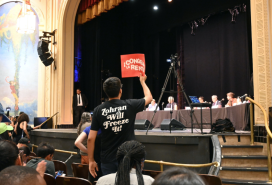NY state legislators propose bills to protect land-lease co-ops from land rent hikes
- The bills would cap how much a land owner can increase the rent underneath a co-op building
- It would also give co-ops a chance to renew their ground lease, or purchase the land itself

The two bills would also allow co-ops to borrow money for repairs and improvements, give co-ops a chance to purchase the land beneath the building, and give co-ops the right to renew a ground lease.
iStock
New legislation—spurred by a co-op in crisis on Billionaire’s Row—would protect a handful of New York City land-lease co-op buildings from rent hikes on the land beneath their buildings.
The two bills would cover the 100 or so NYC co-ops that sit on top of land they don’t own but instead rent from landowners through a ground lease. If passed, the bills would limit ground rent increases to 3 percent or the consumer price index, whichever is greater.
“As these leases expire, the people who live in these co-ops are in grave danger of not being able to sustain huge rent increases,” said Linda Rosenthal, an assembly member who sponsored the bill and represents parts of Manhattan, including the Upper West Side.
The bills could save Carnegie House Tenants Corp., a 324-unit co-op that turned to Albany lobbyists to push for the legislation, from a possibly staggering, million-dollar rent increase when its lease for the land at 100 West 57th St. expires in 2025, The City reported.
The two bills, S7825 in the senate and A5031A in the assembly, would also allow co-ops to borrow money for repairs and improvements (regardless of the terms of its ground lease), give co-ops a chance to purchase the land for the same terms as any other deal the land owner would take, and give co-ops the right to renew a ground lease.
It would have huge implications for the few land-lease co-ops in NYC, and has also raised a debate over what kind of New Yorker deserves legal housing protections.
A brief history of ground lease co-ops
Ground-lease co-ops are rare in NYC, and tend to be a risky bargain for buyers. When a years’ or decades’-long land-lease is up, the land owner could jack up the rent, sell it to an unknown buyer, or terminate the contract and even try to evict the residents.
All that uncertainty makes it difficult for buyers and the board to take on debt, and tricky for sellers to offload their apartments. (At Carnegie House, for example, one owner listed their studio apartment for $99,900—what would be a great deal on Billionaire’s Row, if it wasn’t in a land-lease building.)
“If the land-lease is for a shorter period of time than the borrowing, lenders don't want to make that loan to someone,” said Paul Larabee, an executive at the lobbying group Corning Place Communications, who represents Carnegie House and a coalition of land-lease co-ops across NYC pushing for the legislative protections.
A board battle and an Albany campaign
The bills aim to curb the uncertainty land-lease co-ops face, one that has played out in lawsuits, board disputes, and now in an Albany legislative campaign for Carnegie House.
The Werner Group bought the land beneath Carnegie House for $270 million in 2014, and the co-op pays $4.4 million annually in rent in a deal expiring in 2025, the New York Post reported. Residents fear a five-fold rent increase could force the co-op to dissolve and turn shareholders into rent-stabilized tenants. Some residents even sued their board in 2022 for allegedly endorsing Werner’s $280 million proposal for the co-op to buy the land, according to court documents. (That case was dismissed in January, coincidentally by the same judge that is currently presiding over ex-president Donald Trump’s fraud trial).
Now, residents hope that legislation will do what the courts didn’t.
“You have a situation where the rent is going to go to an astronomical number,” said Massimo D’Angelo, an attorney at Blank Rome who represented residents who sued the board and a consulting firm in 2022. “[This legislation] will ensure that these gazillionaire-type development companies do not take advantage of boards and all the shareholders that boards are supposed to have a fiduciary obligation to.”
(Rubin Schron, one of the Werner Group’s investors alongside David Werner, did not immediately respond to a request for comment, and David Werner could not immediately be reached for comment. Alidade Realty Services, Carnegie House’s building manager, also did not immediately respond to a request for comment.)
The law’s implications, and possible legal challenges
The bills aim to create predictability; with capped rent increases and a right to renew the deal, buyers and boards would have an easier time getting debt, and co-ops wouldn’t be at risk of dissolution.
But it could make the future unpredictable for land owners, and would likely face legal challenges, said Anita Laremont, a partner and land-use attorney at the law firm Fried Frank. She was “100 percent confident” that the legislation would get struck down in court, and argued that it would amount to an unconstitutional taking of private property.
“Anything that modifies or alters the contractual agreement that these co-op unit owners have with the ground lessor would be unconstitutional,” Laremont said.
A representative for State Senator Liz Kreuger, who sponsored the bill in the senate, noted that the bill was drafted to make sure it was constitutionally sound.
For richer and for poorer
The legislation has raised a debate about one huge issue in NYC: wealth. Are the bills a boon to rich Manhattanites? Or will this protect middle-class homeowners? Does it matter if these New Yorkers are rich, poor, or somewhere in between? Should it?
The Real Estate Board of New York has called the legislation a handout to “millionaire co-op owners” who had “full knowledge of these ground-lease arrangements” when they bought their units, Zachary Steinberg, senior vice president of policy at REBNY, said in a statement. (While agents are not specifically required to disclose when a building is under a land lease, it should be clear through the board’s minutes, and the building’s offering plan and financial statement, according to REBNY).
But proponents of the bills have pushed back against that picture. Krueger argued that those that would be protected by the legislation are “mostly middle-income New Yorkers,” and that many bought their units decades ago. Plenty of these land-lease buildings are in Brooklyn and Queens, Rosenthal added.
It’s touchy stuff, and ultimately, New Yorkers will have to wait and see if the bill passes, and later, if it stands up to any possible legal challenges.
In the case of Carnegie House, D’Angelo said that some of the residents are “extraordinarily wealthy,” and some have “been there for 40 years and are about to get kicked to the curb.” (Shareholders would likely become rent-stabilized tenants if the co-op dissolved, The City reported). Ultimately, he said that it’s the Werner Group who stands to gain if the legislation doesn’t pass.
“They've got dollar bags and money in their eyes,” D’Angelo said. “They’re envisioning the next highest tower on Billionaire’s Row and how much they can charge per square foot on a new unit.”






























